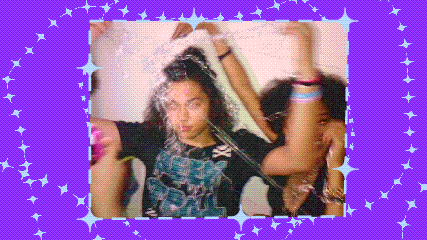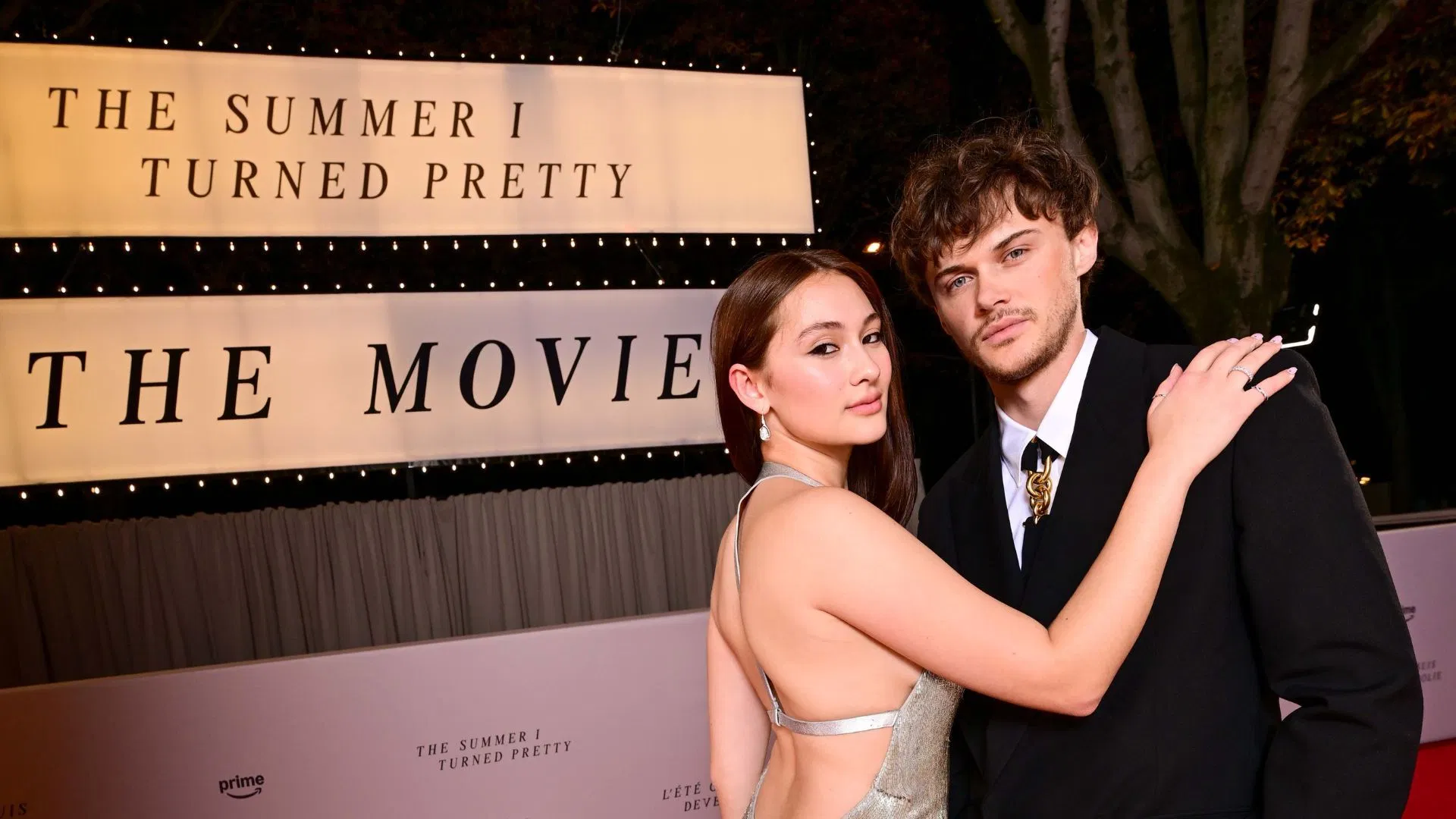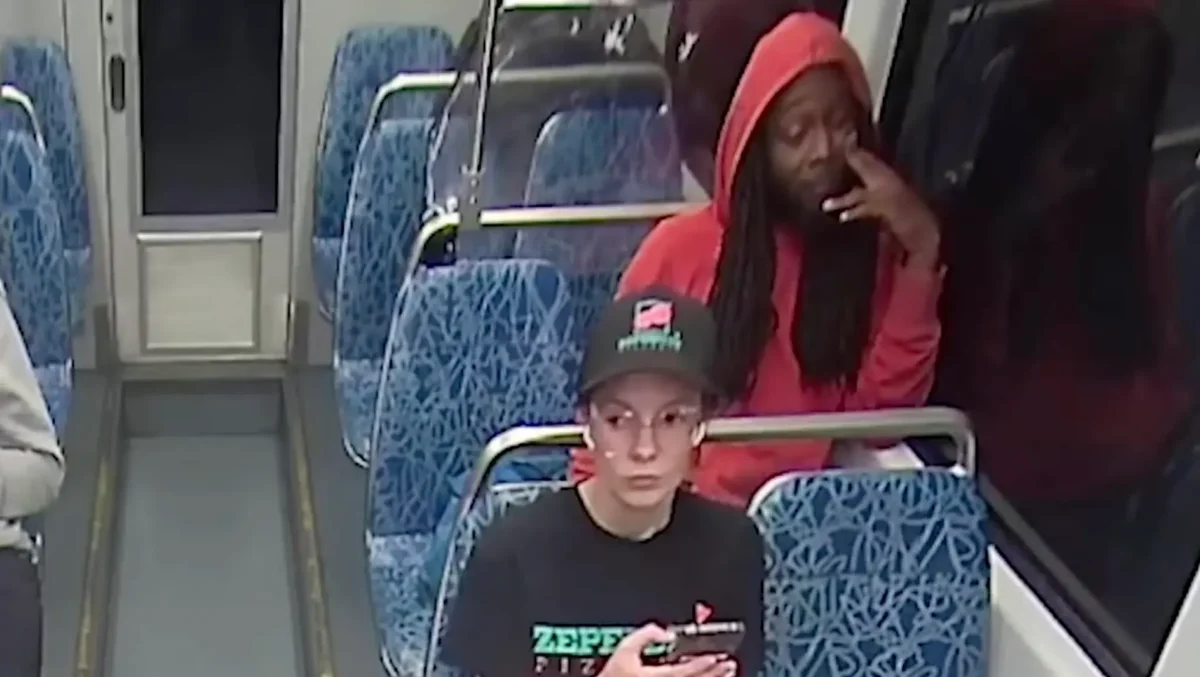By Alphonse Pierre
Copyright pitchfork

One afternoon in Chelsea, during New York Fashion Week, Feng pulls up to a runway event looking like a hungover college freshman. The 19-year-old, part of an emerging wave of UK underground rap getting hyped up like the ’03 NBA draft class, has bags under his eyes. His hair is in a messy bun. He’s wearing a wrinkled white tee, a colorful scarf he bought off Depop, black skinny jeans, and house slippers with the heads of stuffed teddy bears on the top. He glances at the world of high fashion—a mix of magazine editors, brand ambassadors, influencers, models, young rap darlings, and a Los Angeles Lakers role player—and asks his manager, Christian, “Why’s everyone dressed so serious?” Christian responds, “’Cause everyone is putting on a fuckin’ show,” as they both bust out laughing.
After the collection is shown, Feng shuffles around the event space shaking a few hands and snapping photos on his iPhone 5, which makes all of his pictures look like he time-traveled back to 2013. As we make our way outside, he seems curious but relatively unimpressed by Manhattan, referring to it a few times as “corporate.” He’s eager to get to Flatbush, where, later in the night, he’s throwing a house party in the first-floor apartment of a brownstone he gained access to through various Instagram DMs. He hopes that it doesn’t get busted up by the NYPD, especially because he put up some of his own money and turned down an offer from an energy drink company to sponsor the party. “Not everything needs to be branded; not everything has to be about making money—not that money isn’t important,” he says. “Right now, I’m just tryna go out and hang out with cool people and take cool pictures of their outfits and listen to music and make music about it.”
That’s pretty much how his breakout mixtape, February’s What the Feng, came about. With the fadedness of old Piff Gang and the coming-of-age spirit of early Mac Miller, the tape is mostly stories of Feng, who is from south London’s Croydon neighborhood, and his friends running around town, going to parties, meeting girls, and staying out too late. I think I like it so much because it reminds me of being a teenager in New York, where the public transportation made the world feel limitless, even if most of that freedom was used just to try to sneak into bars.
What the Feng is full of heartfelt and earnest writing, sometimes with the slightly corny ultra-positivity of one of those guys who gets drunk and tells all his friends how much he loves them. “There’s some lyrics on there that cringe me out now,” says Feng, with a blushing smile on his face. “But I don’t think that’s a bad thing. I take the mundane things and feelings in life and make them interesting. I know there’s people out there who think I’m lame for it, but I don’t care. I think I’m cool.”
Despite being a rapper of the internet, Feng still writes with great specificity and hyperlocality. To me, rap is always a regional thing, so much about where you’re from, and you get that from his music.“East Croydon, where some man wanna end me/Whitgift Centre with the peng ting/She look better than her friends are/Took an Uber XL to where her ends are,” he raps on “Memories” in a washed out deadpan that is part Lucki, part just the reality of recording on a cheap microphone.
Feng grew up with two older brothers with more than a decade on him, which explains why he has the taste of a 30-year-old with the 2011 XXL Freshman cover still on his wall. When he was a kid, his oldest brother introduced Feng to rappers like Kid Cudi, Drake, and A$AP Rocky, whose hazy, chopped instrumental choices on Live.Love.A$AP feel especially formative on the glitchy cloud-rap beats—produced by himself, Boxxy, and Arizona—of What the Feng. Meanwhile, he absorbed other stuff, like the political dancefloor pop of M.I.A. (“I love pop that also feels like a middle finger to the pop scene”) and UK drill music, which was inescapable. He tells a story about being on the soccer team (he supports Crystal Palace, for those wondering) in high school, where he was apparently a stud midfielder. “We were the team from Cro’, so we were the rough guys who’d go into a rich area and fuck them up,” he remembers, though it’s really not that long ago. “Then we’d leave blasting Unknown T and Digga D.”
Soon enough, he traded in his boots for BandLab. It all started with him having a YouTube channel that grew from gaming videos to teaching himself FL Studio to playing around with cameras and then eventually to laying down glazed raps straight on his iPhone. His self-directed music video style has been a big part of the appeal; “Walk in the Park,” which feels like he’s having flashbacks over a drill beat with the drums stripped away, has the shadowy, low-budget feel of vintage SpaceGhostPurrp, while the bright-colored, fashion-forward “Kids From the West” looks straight out of Skins. For those who lived it, the nostalgia-bait might feel entirely aesthetic, criticism you could extend to much of the current UK underground. Though, in Feng’s case, I think these videos really hammer home the vibe of his music: a bunch of rebellious teens who look like they raided the racks of American Eagle and Zumiez getting into as much shit as they can before it’s time to go get jobs.
What I worry about for this UK underground scene is how this boom and sudden interest (from labels, influencers, and content creators) might flatten the regional uniqueness of the music in an attempt to crossover into the United States. I already felt that in YT’s Oi!, which isn’t nearly as grounded as earlier mixtape #StillSwaggin. And I thought about that as I pulled up to a Fakemink pop-up on the Lower East Side. Fakemink has recently been co-signed by Drake, Frank Ocean, and Timothée Chalamet, so, no matter how you feel about the music, it’s all shrouded in marketability and clout. There’s so much money and fame within reach for these rappers; how does that change the music? “Yeah, people are throwin’ lots of fuckin’ money at us right now,” admits Feng, sitting in a West Village park. “But I don’t need it. I’m making money on my own. I just need to be 100% sure before doing anything, and, right now, I don’t feel 100% sure about anything but making a project that’s me and having my friends around me.”
Later that evening, Feng changes into a Been Trill tee, the likes of which I haven’t seen since the A$AP Mob days, and Rubik’s Cube Vans that the Pack would fuck with. He’s roaming around Lower Manhattan with his friends Jah, who grew up a few minutes away from him in Croydon, and Llondon, another artist, killing time until the party has to be set up. They eat some chain barbecue and do fake New York accents and wonder what “tings” will be at the function later. They stop by the 9/11 memorial where they do an earnest group prayer and then argue with me about Jay-Z not being as popular worldwide as Drake. They take the subway to Flatbush and, once on the Ave., Feng lets out a sigh of relief: “Now this somewhere I could live,” he says as the smell of jerk chicken hits his nose.
On the first floor of the massive three-story brownstone, all of the furniture is cleared out and there’s nothing in the space but a DJ setup and platters of chicken tenders on the kitchen counter. I leave for a moment, only to come back to a place packed with early twentysomethings in YMCMB snapbacks, shuttershades, and anything you might expect to see at American Apparel. Everyone I meet is carrying either a digital camera, a cigarette, or a bottle of Smirnoff vodka. There’s a dude throwing back a tallboy in the empty bathtub. Jah is at the door checking IDs. Llondon is on the stoop complaining to me about the guy-to-girl ratio while the DJ blasts Opium stuff and Xaviersobased. Feng is sitting on the ledge of the steps, snapping pics and flirting with every woman who comes his way.
I meet the owner of the apartment, a nervous 23-year-old whose parents left him the crib so they could move to Long Island. He’s wearing a suit to try to be presentable if the cops come. Surely enough, things start to get a little out of control. Dudes who can’t get in get into screaming matches with Jah at the door, and the party extends out into the street where neighbors start peeking out their windows and standing on their porches shaking their heads. At some point, Chicago bop revivalist Thirteendegrees ° randomly pops up and performs a few songs off his mixtape Clique City Vol. 2. Feng has a drunken smile on his face the entire time.
Around one in the morning, the police do come. A couple kids try to shoot a music video in front of the cop car and another grabs the DJ’s mic and attempts to kick off a “Fuck 12” chant that doesn’t stick. The de facto apartment owner brushes off his suit and goes to talk to the officers, which lasts about five seconds before he starts yelling, “Everyone get the fuck out!” The music cuts off, and, gradually, everyone leaves, murmuring about a rave happening not too far away. I find Feng joyfully chatting up another girl. “I hope you’re having fun; that’s what it’s all about,” he says to me, disappearing into the crowd. Before I leave, I walk past a few kids trying to light leftover joints they found on the ground and another group playing Fakemink out of their whip. I take a glance at the empty living room where nothing is left on the sticky floor but popped balloons, streamers, and empty bottles of Twisted Tea. It wasn’t a perfect party, but at least there were no brand activations.
What I’m listening to



